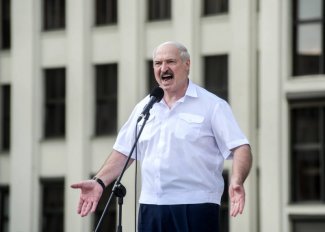Belarus: the government helpless in the face of protests

On 17 August, peaceful demonstrations were still being held all over the country, although their numbers were smaller than those held on Sunday. Opponents of the regime gathered mainly in city centres and in front of police barracks where people detained during the pacification of the post-election protests are still being held. The key manifestation of opposition was the strikes launched that morning in some factories in response to the lack of concessions from the authorities. The following plants gradually joined the strike: in the capital MTZ (tractor production), MAZ (truck production) and MZKT (arms production); BMZ in Zhlobin (metallurgy), Belkaliy in Salihorsk (production of potash fertilisers), and Belaz (production of construction vehicles). The start of a general strike has also been announced by Naftan in Navapolatsk (an oil refinery). State television is also on strike, although after a few hours’ interruption the government managed to restore some programmes, including news services.
The first signs of dissatisfaction among the employees of the Ministry of Foreign Affairs have also appeared. Yesterday, several of them demonstrated their solidarity with the demonstrators outside the ministry building, and the director of the North America & Western Europe department resigned. The Belarusian ambassador to Slovakia also resigned from his post, after several days of expressing solidarity with the demonstrators. A protest of doctors demanding the resignation of the head of the ministry was held in front of the headquarters of the Health Ministry.
In a statement published in the morning of 17 August, Lukashenka’s main opponent Sviatlana Tsikhanouskaya, who is staying in Lithuania, expressed her readiness to assume the role of leader of the nation until new elections to elect the president democratically can be held. She also called on Belarusians to join an indefinite general strike in order to force Lukashenka to resign. In addition to this communiqué, the candidate’s staff announced the creation of a coordinating council for the transfer of power, which includes independent economists, authors (including the Nobel laureate Sviatlana Aleksievich), NGO activists and scientists. At the same time, one of the leaders of Tsikhanouskaya’s campaign staff, Maria Kalesnikava, encouraged officials in a separate statement to switch to the side of the supporters of democracy.
Alyaksandr Lukashenka attempted to hold a dialogue with workers by visiting the MZKT factory. However, despite the careful selection of the group of employees considered by the management to be loyal to the authorities, there was a sharp discussion between the president and the workers, who began to chant the currently popular slogan ‘Go away!’ (although the meeting was not broadcast, recordings from private mobile phones appeared online). Lukashenka did not go beyond his current canon of narrative: he raised the spectre of interference from outside and the country’s return to chaos, corruption and crime as in the 1990s. He unequivocally rejected the possibility of rerunning the elections. He presented himself as the sole guarantor of “the small Belarusian stability”. In response to demands for reform, he repeated his previous declarations that (unspecific) changes to the constitution could be made, while at the same time threatening to use force if the protests became radicalised. He also repeated his threat to dismiss any strikers who ran the risk of “bankrupting the businesses”.
Commentary
- The fall in the number of participants in the demonstration does not mean that the opposition is running out of steam. The protesters are still emphasising their determination to bring about the final victory. There are signs that some of them are becoming radicalised, such as the organisation of demonstrations numbering several thousand people outside police barracks; these are aimed at peacefully forcing the release of all detainees on political grounds. There has also been a dispute among the volunteers supporting the detainees; some are afraid that their public support runs the risk of the detainees being subjected to worse treatment. Difference of opinion have also appeared among the protesters in front of the Health Ministry, some of whom blocked the minister’s departure and threatened to lynch him. Ultimately, he was able to leave thanks to the supporters of a more peaceful form of protest. This dispute may herald a split in the broad opposition movement between supporters of moderate action and those seeking more radical measures. In this context, provocations by the authorities to fuel the emerging splits cannot be ruled out.
- The proposals which Tsikhanouskaya’s staff presented on Monday are the first attempt to develop a strategy for taking power in the country and to implement the main slogan of her campaign, i.e. to rerun elections in which all interested candidates will participate. There is an open question about the effectiveness of this rather vague plan, the more so as the coordination council, which is composed of a great number of people from different backgrounds, may turn out to be just another forum for discussing ideas to transform Belarus.
- The strike action launched on Monday does pose a serious challenge for the government. This is proof that the regime has lost the support of the workers, who hitherto have been one of the most important social groups supporting Lukashenka. In this context, it is dangerous for the authorities to see the solidarity that is being born between this community and the young people and representatives of the middle class protesting in the city streets. It should be emphasised that this wave of strikes has swept across most of domestic heavy industry, including the very profitable factories which are the foundation of the Belarusian economy and exports. As a result, even a strike of a dozen or so days will further aggravate the economic recession which has been ongoing since this January (GDP fell by 1.7% in the first half of the year).
- There are more and more signs of an internal conflict within the Ministry of Foreign Affairs, especially among diplomats responsible for dialogue with the West. The events of recent days have brought about a collapse in the West-leaning activities of Belarusian diplomacy, and so further resignations cannot be ruled out.
- The meeting with the rebellious MZKT workers confirmed the utter inadequacy of Lukashenka’s actions as observed in recent days; despite the circumstances, he is not ready to make concessions or dialogue even with the workers whom (at least in the propaganda dimension) had previously been favoured. The proposal to adopt a new constitution, picked up by the media, is only a rhetorical attempt by the president to avoid introducing real changes in the country. During his visit to the plant, Lukashenka was clearly upset and reacted aggressively to uncomfortable questions, as well as attempts by participants in the strike to record him. At the same time, he is still fully determined to remain in power at all costs, which means that the risk of a return to the use of force (perhaps formalised under martial law) is still high.




